Hundreds of men went charging through the Georgian village of Shukhuti as they grappled for control of a wine-soaked leather ball — a frenzied folk game that locals say is the bedrock of the Caucasus country’s prowess on the modern-day rugby union field.
Held every Easter, the fierce contest pits the village’s upper and lower halves against each other in a bruising effort to drive the ball into a river.
Victory goes to the team that hurls the ball — stuffed with soil doused in locally made wine and weighing a hefty 16kg — into the water.
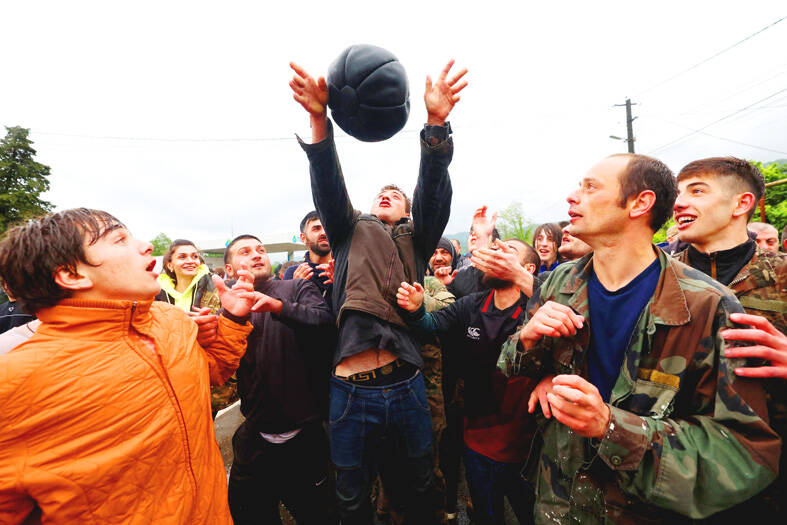
Photo: AFP
Known as lelo burti, the game was first played in Shukhuti in western Georgia more than 150 years ago to commemorate a historic military victory against Ottoman Turkish invaders.
Georgians see lelo as a wild cousin of rugby, a game that has surged in popularity over the past few decades.
Fittingly nicknamed the Lelos, Georgia’s national rugby union team have dominated the second-tier Rugby Europe Championship, clinching the title for eight years in a row.
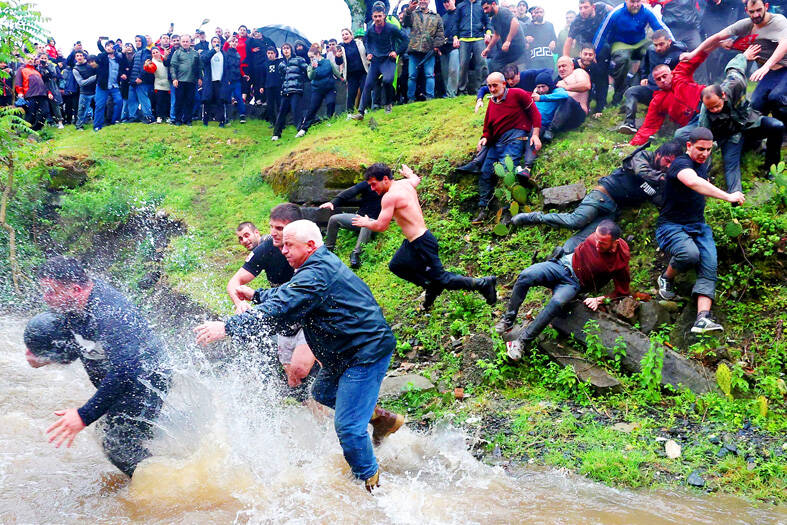
Photo: AFP
“This is where Georgian rugby draws its passion for victory — from the intense energy rooted in the ancient tradition of lelo,” local mayor Alexandre Sarishvili said.
National team head coach Richard Cockerill shares that sentiment.
“We’re a small country with small numbers, but we’re still able to put a team out that can compete with Fiji and Japan and Wales and Italy and win Rugby Europe every year,” Cockerill told reporters at the squad’s Tbilisi training ground.
With just 8,000 registered players — a fraction of the numbers seen in Tier One nations — Georgia have beaten the four sides in the past few years.
Their under-20s team defeated England ahead of the 2023 Rugby World Cup.
Yet Georgia remain locked out of the Six Nations, a closed competition that has not welcomed a new team since Italy joined in 2000.
Former England hooker Cockerill wants meritocracy to trump tradition when it comes to the Six Nations line-up.
“We deserve an opportunity to play off against the bottom team, to prove that we are good enough,” he said, referring to Wales’ ongoing dismal losing streak.
“If a team’s lost 17 Test matches on the bounce and is bottom of the Six Nations two years in succession, surely at some point there’s got to be an opportunity for Georgia,” he said. “We’re above Wales in the world rankings ... but the gate’s shut, isn’t it?”
Although he says that the push for inclusion is a long shot, Cockerill argues that a promotion-relegation playoff would introduce incentive and risk — benefitting the sport.
“There’s a realistic chance that whoever wins Rugby Europe would actually put huge pressure on whoever finishes bottom of the Six Nations. If we’re going to grow the game ... then I think there should be some jeopardy,” he added.
With enthusiastic public support and strong government backing, rugby is thriving on a grassroots level in the capital, Tbilisi, and beyond.
However, Cockerill warns that growth will stall without greater competitive exposure.
“We need to learn how to lose, and play as Italy have, as France did when they joined the Four Nations to make it Five Nations, as Fiji have done when they’ve joined Super Rugby,” he said.
He envisions a similar trajectory for Georgia and laments that all the country’s best players move abroad to play in competitive club competitions.
For now, Georgian rugby is stuck in a holding pattern.
The new Nations Cup format, which groups them with other Tier Two sides, offers no path for promotion until at least 2030.
“We’re being told to wait five more years,” Cockerill said. “That’s not growth, that’s containment.”
In Shukhuti on Sunday, after hours of punishing scrums, torn shirts, and battered bodies, the men of Upper Shukhuti finally broke through and claimed a hard-won victory.
“Lelo captures the combative spirit of Georgians,” said local doctor Nanuli Khalvashi, 64, who came to cheer for the Upper Shukhuti team. “With a sporting tradition like this, it’s no wonder Georgia have become a force in rugby.”
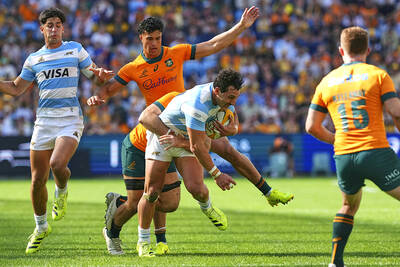
‘DEVASTATED’: Argentina’s win was a reversal of their 28-24 defeat last week, with Australian forward Fraser McReight adding that ‘we did the same thing last week’ Argentina flyhalf Santiago Carreras punished an undisciplined Australia with 23 points off the tee as the Pumas held on grimly for a 28-26 win in Sydney yesterday to breathe new life into their Rugby Championship campaign. A try-fest beckoned in afternoon sunshine at Sydney Football Stadium, but Argentina needed only one through captain Julian Montoya, with Carreras doing the damage with seven penalties and a conversion in front of a sell-out crowd. A week after letting a 14-point lead slip in a 28-24 defeat to Australia in Townsville, Argentina saw most of a 21-point advantage erased in the final quarter as the
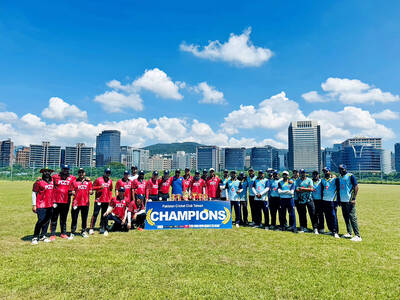
Captain Vijay Kumar led the way yesterday as the Hsinchu Titans claimed the Taiwan Premier League title at the Yingfeng Cricket Ground in Taipei’s Songshan District (松山), beating PCCT by 27 runs. The weather was a topic again, but not the rain that played a role in previous matches in the often-delayed tournament. Kumar, who made 80 not out from 63 deliveries, and teammate Vishwajit Kumar (58 from 43) rescued the Titans from a precarious state at the end of the power play in the T20 match. The visitors were put in to bat and struggled to 26-3 as PCCT
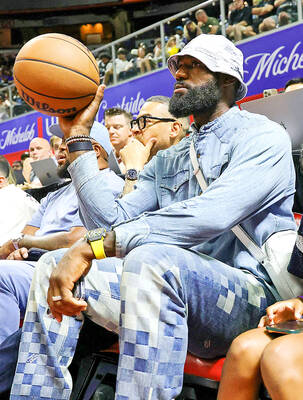
China’s state-run People’s Daily newspaper on Monday published an essay about Chinese basketball it said was written by LeBron James, but a representative for the NBA star said on Thursday that the article was based on a series of interviews. The paper, better known as the mouthpiece of the Chinese Communist Party, had said James authored the essay, “Basketball is a Bridge that Connects Us,” a tribute to Chinese players and fans of the sport written in the first person. “LeBron James Pens an Article in the People’s Daily,” read a post published on the newspaper’s official WeChat account. On Thursday, a representative

San Francisco Giants pitcher Teng Kai-wei impressed against the Arizona Diamondbacks on Monday despite an 8-1 loss in the opener of the team’s nine-game road trip. Teng, the only Taiwanese pitcher active in MLB, struck out five while allowing two hits and one walk over four innings at Chase Field to finish with a no decision, as the teams were tied 1-1 when he finished his outing. He surrendered the lone run of his outing in the bottom of the first, which began with a walk, a hit-by-pitch and two strikeouts. Diamondbacks leadoff hitter Geraldo Perdomo advanced to third on